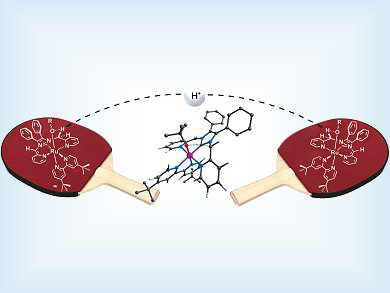Understanding the mechanism of metal–ligand cooperative O–H splitting, especially with water, is relevant to renewable energy applications and the environment. Suitable catalysis candidates are transition metal complexes that exhibit metal–ligand cooperative reactivity and that have ligands that do not contain oxidizable donor atoms, such as phosphines, which can readily react with H2O or O2.
Robert Morris and colleagues, University of Toronto, Canada, have designed and synthesized a phosphine-free ruthenium pincer complex with a central N-heterocyclic carbene donor and methylpyridyl N-donors. The complex undergoes regioselective, intramolecular C–H/O–H bond cleavage and proton exchange at room temperature by aromatization/dearomatization of the two outer pyridine rings.
This process is facilitated by a coordinated tert-butoxide ion. The bulky alkoxide base plays an important role in the coordination sphere of the metal by acting as an intraligand proton shuttle. The researchers note that although this has not been observed in other metal–ligand cooperative systems, it may be operative in other pincer-type systems in which alkoxide bases, alcohols, or water are employed.
Initial water-splitting experiments show that the alkoxo–amido complex reacts with water to form a dearomatized ruthenium hydroxide complex, a first step towards designing new metal–ligand cooperative systems for water splitting.
- Intramolecular C–H/O–H Bond Cleavage with Water and Alcohol Using a Phosphine-Free Ruthenium Carbene NCN Pincer Complex,
Demyan E. Prokopchuk, Brian T. H. Tsui, Alan J. Lough, Robert H. Morris,
Chem. Eur. J. 2014.
DOI: 10.1002/chem.201404819




